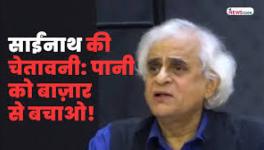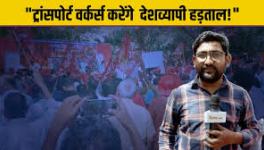Amendments to Electricity Law Flayed by Power Employees, Protests Held in 680 Districts
Powermen, including engineers, today held a countrywide protest against the privatisation of the state-owned power distribution companies (discoms) and the controversial amendments to the 2003 electricity law which pitches for the same, along with granting subsidies directly to the consumer – bypassing the pricing mechanism.
The Electricity (Amendment) Bill 2020, which carries those changes, is expected to be tabled in Parliament in the upcoming Monsoon Session. In a parallel move, earlier in May this year, Finance Minister Nirmala Sitharaman had announced privatisation of power distribution in Union Territories (UTs), as part of Centre’s response to the COVID-19-triggered economic disruptions.
On Tuesday, demonstrations were staged at over 11,500 sites, covering 680 districts, across the country, said Prasanta N Chowdhury, convenor of National Coordination Committee of Electricity Employees and Engineers (NCCOEE). The committee, which gave the protest call, is amalgamation of unions and national federations of electricity workers and engineers.
The protest saw a cumulative participation of more than half a million government sector power employees, he added.
Protesters held rallies and organised gate meetings outside the power generating plants, discoms’ zonal offices, etc. where they raised slogans demanding withdrawal of the proposed amendment bill, according to a statement issued by the committee on Tuesday.
“The employees reiterated their opposition to transferring assets of the power network to private hands – cronies closer to government – protests today which were part of the sustained campaign of the power sector unions, running for years now against the ‘anti-people’ policies of the central government,” Chowdhury told NewsClick.
The Centre, led by the BJP government, drew flak for going ahead with handing over the power distribution wings to private players in UTs. The process has already begun in Puducherry, Chandigarh, Jammu & Kashmir and Ladakh, according to the protesting federations. Reportedly, the Centre plans complete privatisation of all UT discoms by January next year.
Simultaneously, the Uttar Pradesh government has started the privatisation of Purvanchal Vidyut Vitran Nigam (Varanasi), in addition to the three discoms of Odisha that are slated to be privatised by its state government, the federations have added. The latter had also already handed over a power utility, Central Electricity Supply Utility (CSEU), to Tata Power, in a move that had irked the powermen.
Passing the business of supplying electricity to private sector entities – a proposition also made by NITI Aayog, Centre’s premier policy think tank, in its 2018 strategy paper – has time and again been flayed for seeking to ‘privatising’ the profits, while the losses remain ‘nationalised’.
“Enough evidence is available when it comes to the ‘miserable failures’ of inducting private players to distribute electricity,” said All India Power Engineers’ Federation (AIPEF) Chairman Shailendra Dubey, while referring to the examples of Nagpur, Aurangabad, Jalgaon, Gaya, Agra, Greater NOIDA among others. Notably, Delhi and Odisha can also find place in the same list.
Imposing the failed model of ‘reforms’ in the power distribution sector will thus “go against the interest of the consumers,” specifically of those belonging to the economically weaker sections, Dubey added.
In April this year, when the country was still bearing the cost of a mismanaged lockdown imposed in the wake of virus spread, the Union power ministry introduced a fourth draft of the Electricity (Amendment) Bill, seeking stakeholders’ comments within three weeks – giving a wide berth to the already raised concerns of power employees and experts. The amendment bill was first introduced in the year 2014, by the erstwhile NDA government.
On July 3, The Union Power Minister R K Singh committed in a power ministers’ conference to place a modified draft of the Bill, Dubey claimed, after 11 states and 2 UTs recorded their opposition to the amendments. The commitment, however, remains unfulfilled as yet, according to him.
Moreover, experts have also criticised the centre for “crossing” federal boundaries, even as electricity is on the concurrent list of the Constitution.
EAS Sarma, former Union power secretary, in a piece written for Down to Earth, accused the government for bringing in “far-reaching” statutory changes. As for the proposed amendments in the 2020 draft bill, Sarma says that the Centre is concerned more about the “profitability of private solar companies rather than protecting consumer interests”.
Among others, the draft bill also seeks setting up of Electricity Contract Enforcement Authority (ECEA) for settling matters related to power purchase agreements – which is being seen as leading to dilution of the powers of the states and its electricity regulatory commissions, as well as that of Central Electricity Regulatory Commissions that currently looks after state-level and inter-state contract disputes, respectively.
If enacted, the 2020 bill will replace the Electricity Act, 2003 – enacted following the model of “unbundling” promoted by the World Bank – which had trifurcated the state electricity boards into generation, transmission, and distribution. It was done reportedly to enable private companies to enter the more profitable aspect of power generation. Quite evidentially, it eventually led to the current non-performing asset (NPA) crisis in the sector.
The “power employees across the country will be forced to resort to democratic agitational steps, the responsibility of which will be Central and State governments,” AIPEF warned in a statement issued on Tuesday, in case the privatisation spree continues.
We will make sure that it does not become easy for the Centre to bring about the proposed amendments in the draft bill to be enacted in a law, Dubey added.
Also read: How JSW is Managing Bhushan Power Through Former Employees
Get the latest reports & analysis with people's perspective on Protests, movements & deep analytical videos, discussions of the current affairs in your Telegram app. Subscribe to NewsClick's Telegram channel & get Real-Time updates on stories, as they get published on our website.
























